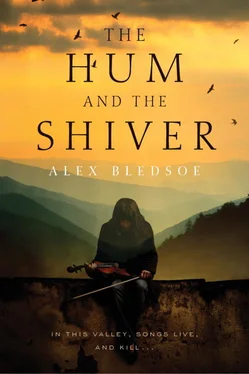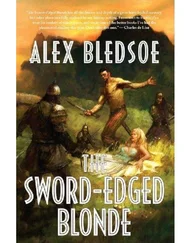Deacon stood beside Chloe, dressed in his funeral suit. It was the only one he owned, and it seemed silly to purchase a new one for something as simple as his daughter coming home. Deacon was a tall, hard-bodied man with a set to his jaw that spoke of the determination of Orpheus, while the twinkle in his eye was more Dionysian. Like Chloe, there was something about him that was both immensely attractive and subtly dangerous, although in his case it was mixed with humor so dry, it blew over most people like dust from the road.
Both Chloe and Deacon were full-blooded Tufas. That meant they looked as much like brother and sister as they did husband and wife, even though they were related only tangentially, as people tended to be in small communities. Outsiders often jumped to conclusions that embraced old clichés of mountain-family inbreeding; Needsville, though, paid the Hyatts the respect their bloodlines inspired, and that their conduct reinforced.
Eight-year-old Aiden watched the trucks approach up the narrow road. He was lanky, his black hair long and unkempt, and he squirmed uncomfortably in his button-down shirt and khakis. He stood at the bottom of the porch steps, practically vibrating with excitement as the first vehicle made the turn into their driveway. Two more pulled in on either side. “Holy shit,” he said.
“You want me to wash that tongue with lye soap, boy, keep up that language,” Deacon said without looking at him. But he agreed with the assessment. They’d watched the parade and speech on television, glad they decided not to meet Bronwyn in town. “You knew it was going to be a big deal.”
“Yessir,” he said, and pointed at the TV news trucks traveling in bumper-touching eagerness behind the final vehicle. “And I also told you we’d need the shotgun.”
Deacon smiled. “Go get it, then. Shut the gate once the army gets through, then keep them TV peckerheads out.”
“Yessir,” Aiden said eagerly, and rushed into the house.
“You sure it’s a good idea to let him use a real gun?” Chloe said.
Deacon shrugged. “He’ll only be shooting reporters. No real loss, far as I can tell. Besides, for every one you shoot, I bet two more pop up.”
“You’re thinking of lawyers,” Chloe deadpanned. Deacon grinned.
Aiden returned with a 16-gauge side-by-side double barrel slung breech-open over his shoulder. His shirttail was already untucked. He rushed down the hill into the dust. Vague shapes moved through it, but none of them seemed to be Bronwyn. Finally four big men emerged onto the yard, pushing something between them.
Chloe stood. “My baby girl,” she said very softly, and hummed a tune only Tufa mothers knew.
* * *
Bronwyn gazed around at the familiar yard, with its old swing set and basketball goal off to the side. Eighteen years of her life had been spent here, yet it seemed far less substantial than the events of the past two. She had to struggle to connect the memories with actual emotions. She remembered using the rented Bobcat to level enough ground so she and her friends could actually play ball; then she’d taken off down the road, intending to clear a new path across the hill to her favorite swimming hole. She’d been eleven then, and it must’ve been exciting. Her father had used his belt on her behind seventeen times that day. Had she been angry about that? Or hurt? She couldn’t recall.
“Bronwyn!” Aiden cried as he bounced down the yard toward her. One of the MPs went for his pistol when he saw Aiden’s shotgun, but Bronwyn said quickly, “It’s all right, he’s my little brother.”
Ignoring the big men around her, Aiden was about to jump in her lap and give her a hug when he saw the metal rings and pins on her leg. He skidded to a stop, eyes wide. “Wow,” he gasped. “Does that hurt?”
“It sure don’t feel good,” she said with a laugh. “But it’s better than it was. Come here, you little muskrat.” They hugged as much as the chair allowed.
“Dad wants me to keep out the reporters,” he said breathlessly. “Gave me a shell for each barrel.”
“What a big, strong boy,” Major Maitland said. “You must be Aiden. You can just run on back up to the house, we have men assigned to guard the gate while your sister’s getting settled.”
“And now you have one more,” Bronwyn said when she saw Aiden’s disappointment. “He can help. The squirrels around here tremble at his name. Right?”
Aiden grinned. Maitland bit back his protest and simply nodded.
“See ya,” Aiden said, and dashed past her toward the gate. Reporters, seeing the end of the line, leaped from their vehicles while they were still moving. They were torn between the certainty of speaking to the people along the road, or the chance of possibly catching a glimpse of their quarry. Many opted to dash for the now-closed gate at the end of the drive. Some looked ready to jump the fence, but the stern Tufa faces looking back at them quickly changed their minds.
Bronwyn turned her attention to the house. It looked exactly as she remembered it, as it probably always would. Along the porch awning hung wind chimes that looked like the tacky ones found in a Pigeon Forge tourist gift shop. When the wind touched them and played their tunes, though, any Tufa instantly knew better.
“Bronwyn!” a reporter screamed behind her.
“Private Hyatt!” another demanded. The voices quickly became a cacophony.
“Take me to the gate,” Bronwyn said suddenly, and tried to turn the chair herself.
Maitland used his foot to block the wheel, knelt, and said, “I think you’d be better off ignoring them.”
“I plan to, but I want to say something to them first.” She met Maitland’s gaze with her own resolute one. “Five minutes, sir, to suck up to the press. You surely can’t object to that.”
He sighed and nodded. The MPs pushed her across the grass, onto the gravel, and up to the gate.
Aiden sat astride the barrier, the gun across his knees. He tried to mimic the stoic stare of the soldiers. A dozen reporters, TV cameramen, and regular photographers battled to get close to Bronwyn. The gate rattled as they surged against it.
Bronwyn smiled into the flashes and held up her hands. “Hey! Hey! Y’all want me to talk, you have to shut up a minute!”
Gradually the media grew quiet except for the fake electronic shutter clicks of the digital cameras. When she had them as silent as they were likely to get, she said, “Y’all, please. I’ve been as nice as I could be to you, talking to you and answering your questions, but this—” She gestured behind her. “—is my family’s home. Y’all wouldn’t want me coming to your place and behaving like this, would you? So please, I’m asking nicely. And you, Tom Karpow, you know exactly what I mean. I talked to you for a solid hour on Nightwatch, you can’t say I wasn’t cooperative. Why are you acting like this?”
The anchorman she designated would not meet her eyes, and the other reporters began to look sheepish as well. It was not her brilliant oratory, she knew, but the combined presence of so many Tufas united in one cause.
In the silence a camera clicked, and some turned to glare at the offending photographer.
“Thank y’all for understanding,” Bronwyn said. “As soon as I’m able, I’m sure the army will have me out stumping for the war. In the meantime, the more you let me rest, the faster I’ll be available again.” She turned to Maitland, who was speechless; even he couldn’t handle the press with such ease. She said, “That’s all, sir. The men can take me to the house now.”
The slope up to the house was harder than it looked, and the soldiers pushing her began to breathe hard with the effort. They stopped below the porch steps, and Major Maitland said, “Hello. I bet you’re Bronwyn’s father, Deke. You must be very proud of your daughter, she’s a real American hero.”
Читать дальше












